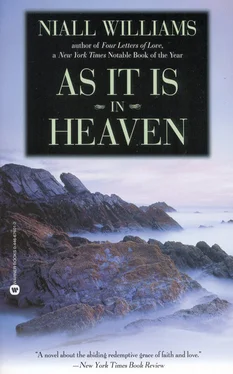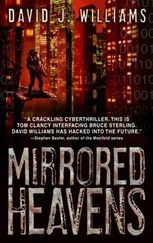 That morning Stephen left at ten o’clock and drove the yellow car from his father’s house in Dublin to return to the west once more. He did not tell his father any more than he had already revealed in the chess game, but as he drove out the Templeogue Road, having waved goodbye, he had the strange sensation of having shared secrecies.
That morning Stephen left at ten o’clock and drove the yellow car from his father’s house in Dublin to return to the west once more. He did not tell his father any more than he had already revealed in the chess game, but as he drove out the Templeogue Road, having waved goodbye, he had the strange sensation of having shared secrecies.
The moment his son had left, Philip had hurried upstairs and taken out his green Harris tweed, white shirt, and thick brown trousers. When he put on the trousers, he was pleased to discover that the material did not cling or bunch about the knees but fell cleanly to his feet. The line of the trousers was critical to a man’s well-being. How often he had seen customers in Clery’s with sagging and baggy trousers, miscut and misshapen, drawn by machines for men that did not exist and worn with a grey pathos, as if declaring how the wearer knew that nothing in the world ever measured up. When the knee pressed the trouser leg the line was lost, a man walked as if he were pushing a wheelbarrow, and shortly life provided him one. If the seat was tight, so too was the life, and soon no button or zip would restrain the pressure. It was a simple philosophy, the metaphysics of tailoring, and Philip Griffin applied to his own clothes everything that thirty years in Clery’s had taught him about humanity. In his bedroom was a full-length mirror, not for the pleasure of his vanity, but because it was only when he was looking at himself in his clothes that he could appreciate the condition of his own health. So when he saw the line of the trousers in the mirror he was relieved; he was still the same distance from the ground as a year previously. None of the raised hemming that was the first sign of certain death was needed, and he began to think that the intrusion of the cancer might not be as far progressed as he had imagined. Then he put on the white shirt. It was cotton. Cotton is a cloth full of forgiveness, and even as Philip buttoned it over the small upturned bowl of his stomach he could feel the innocence in the material. When he had it closed under his chin he was in the morning of his own First Communion and was his father’s hands doing the buttons under his seven-year-old chin. It smelled clean as grace; the buttons were just so, neither slipping back through the holes like those of inveterate gamblers nor resisting going through, like the shirts of bridegrooms. He ran his hands down the sides of his torso and delighted briefly in the smooth and simple elegance of a white shirt. Then he chose a tie; only three in a hundred men knew how to knot a tie. He had proven the figure once with young Dempsey, counting the inept nooses that choked the greater portion of their customers and suggesting it was among the critical wisdoms a father could pass to his son: how to knot a tie. He passed his hand across his face doing his, as if it were a blessing, and then took his jacket from the wardrobe. A tweed; you have to be a certain age to wear tweed, to have the woven strands of your own life reflected in the griefs, hardships, and pleasures of the cloth, and not lost within them like an overcoat. The green Harris was a jacket Philip Griffin had worn for fifteen years; the moment he put his arm through the sleeve he could feel its cool lining like a second skin. The comfort he felt in the jacket was a testimony to his own life, the weight of it, the roughness of the cloth that had diminished now to a rubbed softness; he wore it like evidence of himself, and once he had put it on looked in the mirror to see if he still looked the same.
He did.
“The cancer hasn’t shrunk you yet,” he told himself.
He took the keys to his car and went downstairs. The urgency of what he must do struck him once more as he confirmed the direness of Stephen’s heart by a glance at the chessboard in the sitting room. In the daylight it was more alarming than ever, and a moment later he was driving quickly into the city in the car that held like a stubborn memory the scent of white lilies. He drove as quickly as he could in the impossible knot of the morning traffic. The sky was pasty and mottled, holding away the light above the gathered clouds like a resentment, and preparing the lunchtime rain. Dublin barely moved in the early morning; rather, from the ringed estates of new houses that had taken away the mountains, cars hurtled a quarter of a mile and then slowed abruptly into the swollen and choked arteries of the city, where they inched like thick oil towards the heart. Philip Griffin drove a half metre behind the backside of a bus. He had not been in traffic since he had retired and felt with a small fall of his heart how the city had grown without him. We are smaller and more insignificant than we ever imagine, he told his wife. But then the scent of the lilies reached him again and he felt only the significance and urgency of his own role in the plot of his son’s loving. He rolled down the window and waved his arm at the young driver in the car next to him.
“Emergency!” he cried out, and pulled the car into the outer lane.
It was half an hour later when he arrived in the waiting room of Dr. Tim Magrath. He had no appointment, but told the receptionist he needed to know how long he had to live and would wait to find out. He opened the button of his jacket and sat down. He took his fresh handkerchief and dabbed the top of his head. His head was damp and his lips were dry, but otherwise he showed no signs of a fatal illness, and for a moment considered the remote possibility that in fact he was not carrying a cancer after all. From the morning he had diagnosed himself he had never sought any medical confirmation; he had been more certain of his condition than any test could prove. The cancer was his companion, and on wet mornings in early summer he could sometimes feel it invade a new region of his bowel, moving like a dark liquid or a shadow in the undetected privacies of his organs. He read its evidence in a dozen different ways: in the slowness of his movements when he sat on the toilet, in the taste of chewed chalk that prevailed on his palate when he ate beef, in the interminable bouts of his gas, the sudden exhaustion in mid-afternoon, and the pain that was like passing marbles when he urinated. And of very many, these were only a few. Until the moment he sat in the doctor’s waiting room he had not considered for one minute that he could be wrong. But now, briefly, within the inviolable comfort of the Harris tweed, and desperate for a stay of death to help his son, Philip wished heartily that he was. Or at least he wished that death was not so close, that the latest rumblings and squelchings he heard below his stomach in the early morning were not the telltale signs of the further progress of the disease. If I can live for another while, he thought. If I can live long enough to see Stephen through the far side of this. He swallowed the sadness that rose in his throat at the thought of his son, but it kept coming, and he had to tilt his head back and pretend to admire the ceiling.
An hour passed. Philip studied the backs of his hands, where he knew all manner of signs were made visible, and that the freckles and sunspots of early vitality became there the bumps and splotches, scaliness, discoloration, and moles in which every organ speaks. The more time passed, the more ill he felt himself becoming. It was too warm in the bright room; there was a cramping sensation in his left thigh, the toes of his right foot were going numb. He was breathing shallowly. He asked for a glass of water, but was even more alarmed when he drank it and realized it tasted of bitter lemons.
When the last patient had left the waiting room, Philip Griffin stood up, felt his heart racing, and quietly began to say the Our Father. It was not something he was accustomed to doing, and he began it slowly and carefully, feeling with each phrase the discernible slowing of his heart rate and the evanescence of his panic. Our Father who art in Heaven, hallowed be Thy name, Thy kingdom come, Thy will be done, on earth as …
Читать дальше

 That morning Stephen left at ten o’clock and drove the yellow car from his father’s house in Dublin to return to the west once more. He did not tell his father any more than he had already revealed in the chess game, but as he drove out the Templeogue Road, having waved goodbye, he had the strange sensation of having shared secrecies.
That morning Stephen left at ten o’clock and drove the yellow car from his father’s house in Dublin to return to the west once more. He did not tell his father any more than he had already revealed in the chess game, but as he drove out the Templeogue Road, having waved goodbye, he had the strange sensation of having shared secrecies.









